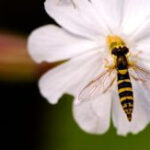Flies are a common nuisance for homeowners across the United States, with house flies and fruit flies being the most prevalent species buzzing around homes. While these pests are known for their rapid reproduction rates, many people wonder about the lifespan of these insects. Understanding How Long A Fly Can Live is crucial for effective pest management and preventing infestations.
The Fly Life Cycle: A Quick Overview
Before diving into specific lifespans, it’s important to understand the general life cycle of a fly. Flies undergo complete metamorphosis, meaning they have four distinct stages: egg, larva, pupa, and adult. Female flies typically lay their eggs near a food source, ensuring the larvae have immediate access to nourishment upon hatching. The time it takes for an egg to hatch into a larva can vary, but for house flies and fruit flies, it generally ranges from a day to about a week. After hatching, the larvae feed and grow before transforming into pupae. Finally, they emerge from the pupal stage as fully developed adult flies.
House Fly Lifespan: Living Fast
When considering how long a fly can live, house flies are often the first to come to mind. The average house fly lifespan is around 28 days, or approximately one month. During this relatively short period, a female house fly is capable of laying five to six batches of eggs. This rapid reproductive rate explains why house fly populations can quickly escalate, especially during warmer months. While they are most active in the summer, house flies can reproduce throughout the year in suitable conditions, making them a persistent pest.
Fruit Fly Lifespan: A Bit Longer
Interestingly, fruit flies, another common household pest, tend to live slightly longer than house flies. The typical fruit fly lifespan ranges from 40 to 50 days. Similar to house flies, fruit flies are prolific breeders. A single female fruit fly can produce up to 500 offspring during her lifespan. This high reproductive capacity, combined with their slightly longer lifespan, contributes to the rapid infestations often seen around ripe fruits and vegetables.
Why Fly Lifespan Matters for Pest Control
Understanding how long a fly can live isn’t just a matter of curiosity; it’s vital for effective pest control. Both house flies and fruit flies are more than just annoying; house flies are known to spread diseases, while fruit flies can contaminate and spoil food. Instead of simply waiting for flies to die off naturally, which as we’ve learned can take up to almost two months for fruit flies, proactive measures are essential.
Preventing flies from entering your home is the first step. Ensure window screens are in good repair to block entry. Proper sanitation practices, such as regularly cleaning trash cans, garbage disposals, and sink drains, are also crucial to eliminate breeding grounds. These simple steps can significantly reduce fly populations.
For established fly infestations, professional pest control services may be necessary. Trained professionals, like those at Orkin, can effectively assess the situation and implement targeted treatments to manage fly problems. Don’t let the short lifespan of a fly lull you into complacency; their rapid reproduction means that taking swift action is the best way to keep your home fly-free.
